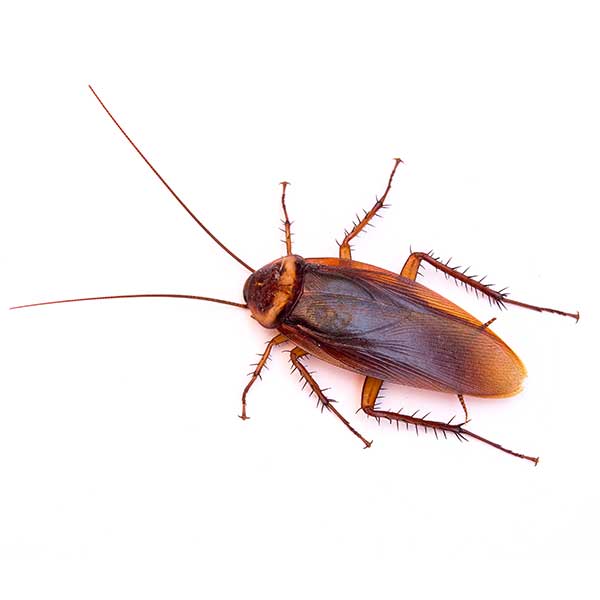Pest Description
American Cockroach Habits
American cockroaches will be found in large number in restaurants, multifamily housing structures, residential homes, and hospitals. American cockroaches are also found often in restaurants or other commercial structures where food is prepared or stored, but they will also attempt to gain access to multifamily or residential structures (often through sewer systems and piping). Brown-banded roaches are more likely to infest private residential homes or multifamily housing structures than in commercial settings, but once inside will not discriminate between types of rooms. Oriental cockroaches will nest either indoors or outdoors, but have a strong preference for moist, humid areas. Their numbers don’t get nearly as high as with other species, but if the conditions are ideal then their populations may thrive.
Cockroach Damage
Cockroaches are not a structural pest in that they do not do physical damage to buildings or surroundings; however, they can be a significant health concern and a difficult nuisance. Cockroaches can contaminate food products with their bodies or their waste products; they may also leave a disturbing odor in areas where infestation has taken place. Foraging cockroaches can also be vectors of disease, depositing germs or bacteria in areas that they infest and causing attacks of asthma in some people prone to reactions to cockroaches.
Preventing American Cockroach Invasions
Cockroaches are a disgusting pest to have in one’s home; however, there are some great ways to limit the risk of cockroach infestation. Sanitation and cleanliness are the most important tools in your arsenal against cockroaches; cockroaches love to dwell in areas that are poorly cleaned, and will usually gravitate towards those areas where there is adequate food, water, and shelter for them. In restaurants that are not cleaned thoroughly, for example, it become nearly impossible to completely eradicate cockroaches. Special attention to cleanliness and sanitation — particularly in the kitchen(s) and bathroom(s) — will be very beneficial. Caulking and sealing small gaps underneath doors and in windows as well interior molding, anywhere they can touch their front and backs is also a great way to keep roaches out. It is always harder to get cockroaches out of your home than it is to prevent them in the first place.
American Cockroach Control
In some situations, cockroaches will become a problem due to factors outside of your control. In multifamily housing situations where there are shared walls with plumbing, you may have a neighbor next door (or elsewhere in the building) whose behavior is contributing to an existing cockroach problem. In those cases where treatment becomes necessary, here are the recommended steps for treatment:
- Inspection. A thorough inspection for conducive conditions, recommendations for prevention, and an assessment of infested areas is important to developing a treatment plan that works.
- Treatment. There is a large assortment of products currently available for roach control. Treatment may include a combination of different types of gel baits, dusts, or liquid products to be applied. Your service technician will use the products that he/she deems most appropriate and most likely to produce the desired outcome.
- Ongoing Prevention. In some cases, follow-up treatment may be necessary to get the roach infestation under control. Additionally, vigilance in keeping all areas as clean, sanitized and free of clutter as possible will contribute to effective cockroach control.









